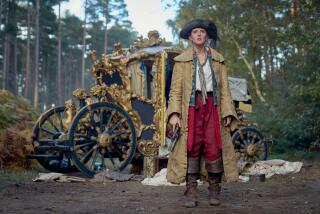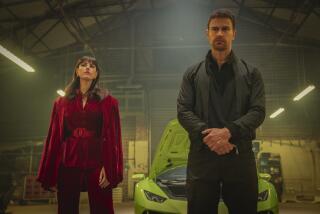Review: In âTrue History of the Kelly Gang,â a brutal, sexy, spellbinding take on outlaw legend
At the beginning of âTrue History of the Kelly Gang,â the young Ned Kelly (Orlando Schwerdt) peers into a hut through a window and spies his mother, a prostitute, servicing one of her regular johns. Near the end of the movie, and of his own short, storied life, the fully grown Kelly (George MacKay) stares out through the slit in his tank-like iron helmet, watching the advancing soldiers who will soon bring him to a kind of justice. Sex and death, boyhood and manhood: In between these two visually linked bookends, Kelly seems to exist at a wretched remove from lifeâs bounty, forever flailing at something that sits tantalizingly out of reach.
Australian director Justin Kurzel occasionally offers you a glimpse of that something: It might be a lovely interlude in which Ned reads a snippet of poetry to his friend Joe Byrne (Sean Keenan) or a fleeting moment of tenderness with his sweetheart, Mary Hearn (Thomasin McKenzie).
But these are fugitive intimacies, and for Ned, there is no real escape from his first and most ferocious love: his mother, Ellen (Essie Davis, âThe Babadookâ), who confers on him a singularly cruel destiny. âMy Ned loves me,â she murmurs, a declaration of ownership that the extraordinary Davis infuses with pride, contempt and a flicker of near-Oedipal lust.
And there are worse ways to think of this movie than as a Freudian spin on a folk legend. Freud would certainly have some thoughts on the storyâs most outrĂŠ invention, which also conjures its most resonant image: a man riding a horse while wearing a red gown, streaking like a ball of fire across a cold gray landscape. The real-life Kelly may have been famed for his homemade armor, but for this one and his gang, womenâs dresses provide their own form of protection: âIf you wear a frock to a fight, theyâll think youâre crazy,â one of them reasons, âand nothing scares a man like crazy.â
âTrue History of the Kelly Gang,â for its part, strikes just the right balance of scary and crazy, and it subjects both to an impressive measure of discipline. Adapted from Peter Careyâs Booker Prize-winning 2000 novel, this is an artful, often gripping revisionist portrait of the 19th-century outlaw often regarded as Australiaâs answer to Jesse James. Its sympathetic reading of a notorious bank robber and cop killer is not in itself anything new: Kelly has long been mythologized in books, plays, songs and movies, which often frame his criminal exploits as a matter of principled rebellion against the tyranny of English rule.
The difference lies in the boldness of the execution. The none-too-memorable 1970 film âNed Kellyâ starred Mick Jagger, but this new movie is the one whose sensibility feels authentically punk. Stripped down and glammed up by turns, awash in realistic blood and stagy strobe effects, itâs as tough and brutal as you might expect from Kurzel, whose âMacbethâ and âAssassinâs Creedâ shared the same gaudily violent MO. But the director isnât merely repeating himself. His filmmaking here exudes gravity and purpose, placing the bookâs gnarled period vernacular in counterpoint with his own muscular cinematic language.
Screenwriter Shaun Gray (who also penned Kurzelâs grimly accomplished debut feature, âThe Snowtown Murdersâ) frames the story around a series of letters Ned is seen scribbling by firelight, recounting his life and justifying his actions to his unseen child. That Kelly is not known to have fathered any children is one of many clues that âTrue Historyâ might be a misnomer.
Like most good dramatists, Kurzel and Grant seem less concerned with strict factual accuracy than with psychological plausibility. Rather than offering up another well-traveled biographical formula, they want to plunge deeper and darker, to allow the wild, untamed perversity at the storyâs edges to flourish and grow toward the middle.
To return to the Oedipal theme: The first of the movieâs three acts, devoted to Nedâs impoverished upbringing in a scorched-earth backwoods, introduces not just an all-consuming mother but also a succession of dubious father figures. There is Nedâs biological âda,â Red Kelly (Ben Corbett), an Irish-born convict who dies early on, tormented and humiliated along the way by an English sergeant, OâNeil (Charlie Hunnam), who regularly calls on Ellen for sexual favors. Ned gets his shot at revenge against OâNeil in a scene that plays like an unnerving castration fantasy, egged on by Harry Power (a superb Russell Crowe), the famous bushranger who takes the boy under wing.
But Nedâs apprenticeship does not go well, and Harryâs influence leaves its own ugly scars. The remarkable young Schwerdt, with his blond locks and haunted eyes, makes a beautiful vision of corrupted innocence. Ned seethes at his mother, who betrayed him by selling him off to Harry, but he also inherits her bitter struggle against their British oppressors. The second act pointedly kicks off with a wild scene in which MacKayâs increasingly unhinged Ned, now a bare-knuckle boxer, stretches out his body before a Union Jack â that hated national symbol of an enemy with many faces, all of them loathsome.
But not necessarily unattractive. Enter a formidable new nemesis, Constable Alex Fitzpatrick (a dangerously sexy Nicholas Hoult), whose initial meeting with Ned plays like both a confrontation and a seduction. Sexual desire and blackmail are among the many weapons the constable proves willing to use as he begins a sadistic campaign of persecution against Nedâs loved ones, including his siblings Dan (Earl Cave) and Kate (Josephine Blazier), and of course the indomitable Ma Kelly, asserting herself to the end as this familyâs dark heart and soul. Davis and Hoult, among others in the fine ensemble, give such sharply etched performances that they run the risk of overshadowing their fine star.
I mention this as more of an observation than a criticism. MacKay, last seen as the quietly heroic British soldier in â1917,â has a gift for taciturn reserve, as well as a tendency to deflect rather than inhale the cameraâs gaze. His casting shrewdly reinforces the movieâs conception of Ned as a reactive, contemplative figure, someone who has absorbed one blow after another and now assumes the roles of gang leader and familial protector with more obligation than glee. Even when he storms and rages like a madman, he suggests a man who hasnât chased after his grim calling so much as had it foisted upon him.
The movie pulls us in close to Ned Kelly â we smell his fear and share in his exhilaration â but it also allows him, and us, a crucial measure of distance. That distance often manifests itself in Kurzelâs formal and structural choices, from the title cards that separate the movieâs three acts to the occasional use of strobe effects and spare, theatrical backdrops, conjuring the sense of a hellish Brechtian rave. Even the frenzied strings of the music (composed by the directorâs brother, Jed Kurzel) serve to underscore this movieâs sharpest insight: A measure of artifice can offer the most direct path to the truth.
âTrue History of the Kelly Gangâ
Rating: R, for strong violence throughout, bloody images, pervasive language, sexual content and some nudity
Running time: 2 hours, 4 minutes
Playing: Available April 24 on VOD
More to Read
Only good movies
Get the Indie Focus newsletter, Mark Olsen's weekly guide to the world of cinema.
You may occasionally receive promotional content from the Los Angeles Times.











